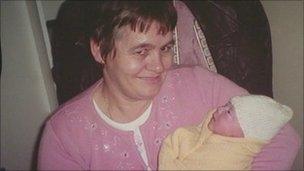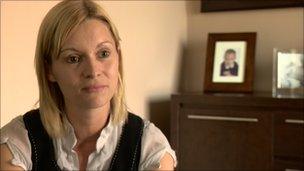North Staffordshire patient deaths inquiry 'overturned'
- Published

June Harriman died in 2009 after suffering a major stroke
A decision to investigate poor care at University Hospital North Staffordshire was overturned by the head of the Care Quality Commission, Cynthia Bower, it has been claimed.
The green light to begin an investigation was given at an emergency "risk summit" meeting in April 2009 following concerns over the deaths of three patients.
But the following day, it was stopped, says BBC Midlands health correspondent Michele Paduano.
This followed a meeting between Ms Bower and the West Midlands Strategic Health Authority.
Dr Heather Wood, formerly of the Healthcare Commission, who had investigated and uncovered the catastrophic failings at Stafford Hospital was at that meeting.
She said: "I was informed the following morning that the decision to refer to investigations had been overturned.
"My understanding is that this followed a discussion between the West Midlands Strategic Health Authority and Cynthia Bower."
According to witness statements, Ms Bower said that this was the first risk summit meeting following the creation of the Care Quality Commission and that she felt that they needed to tackle poor care quickly.
Investigations took too long, according to Ms Bower who said she favoured a more collaborative approach.
"In this context, my conversation with the West Midlands Strategic Health Authority led me to believe that collaborative working, through use of a Strategic Health Authority-led 'appreciative enquiry', would be the most appropriate way forward," Ms Bower is quoted as saying.
The investigations team was disbanded shortly afterwards.
In response to the claims, the CQC said: "Because the Inquiry is still running and because CQC is a core participant, we can't provide any comment on its proceedings or other evidence presented to it; it's for the Inquiry to come its own conclusions on the basis of all the evidence it hears."
One of the patients whose death in early 2009 helped to raise concerns about care at University Hospital North Staffordshire was June Harriman.
The fifty-two-year-old grandmother had twice been to accident and emergency complaining of headaches.
On the second occasion, she collapsed following a major stroke. Mrs Harriman had waited nine hours without seeing a doctor.
Her family has just received a six figure sum in compensation following an out of court settlement.
A consultant neurosurgeon, Munchi Choksey, gave her an 80% chance of survival if she had been scanned on the first occasion she had been admitted to hospital.
The hospital's chief executive, Julie Bridgewater accepted there had been failings.

Sharon Whiston said her mother's care should have been investigated
"Following a thorough investigation of concerns raised, we regrettably identified that some aspects of the A&E treatment we provided to Mrs Harriman did not meet the standards we would have expected on this occasion," she said.
"A full internal investigation was also conducted to ensure that lessons could be learned."
Mrs Harriman's daughter, Sharon Whiston, said: "We were aware of problems in Accident and Emergency at that time.
"I think that the surprise is that they didn't do it. Because something needed to be looked at.
"My mother was one of those cases during that time. It needed to be investigated. Why it wasn't, I don't know, but it needed to be."
The risk summit meeting was told that the North Staffordshire Coroner had concerns about two other deaths; that of a child and a 91-year-old man.
Patients had also been sent to a hospice with the wrong medication and different sets of notes.
Ian Sime, from North Staffordshire Health Watch, said: "We are talking about very serious stuff in acute care and we are talking about people who die.
"You can't have light touch regulation. You have got to be quite hard and disciplined."